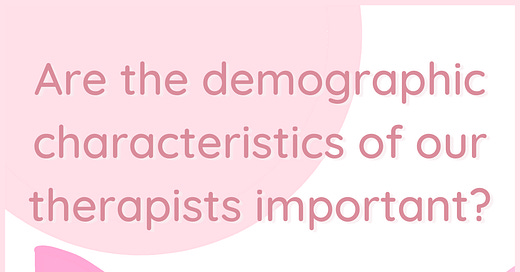Many times, people who are new to therapy will ask whether the demographic characteristics (e.g., gender, race/ethnicity, age, sexual orientation, etc.) of their therapists matters. That is, is therapy more or less effective based on the therapist’s demographic characteristics? The short answer is potentially. Research suggests that the biggest predictor for the effectiveness of therapy is how connected one feels with their therapist. However, like most things in therapy, the actual answer is much more complex.
People often go into therapy with specific criteria they want their therapist to meet or identities they want them to hold – more often than not, clients typically seek therapists who hold similar identities and demographic characteristics as them. For instance, female clients may prefer to work with female therapists, people of color may prefer to work with therapists of color, and queer clients may prefer to work with queer therapists. This is because of several reasons. Some people may feel that therapists who are like them may understand them better and will, in turn, be better therapists. Other clients prefer to work with therapists of similar backgrounds out of comfort; they may feel like it would be easier to talk to therapists who understand the nuances and colloquialisms of various identities. There are also clients who seek therapists who are like them out of safety, such as people of color who prefer to work with therapists of color because of the inherent power dynamics that would exist while working with a white therapist.
In the same way that there are people who seek therapists who are similar to them, there are also people who seek therapists who are different from them. This may be because someone feels more comfortable or even safer discussing their experiences with someone of a different background. Some people may believe that people who are different from them may be better therapists overall because of representation (or other personal beliefs). For example, most therapists are women, so some people may feel that female therapists are more competent than male ones. There are also people who do not care about the demographic characteristics of their therapists.
Overall, the demographic characteristics of your therapist matters to the extent that they matter to you. Therapists of all backgrounds are competent and well-equipped to support you and your experiences. However, if you do not feel safe or comfortable with someone, know that it is your therapy, and your comfort and safety is important. It may be beneficial to ask yourself why and whether it would do more harm than good to enter into a therapeutic relationship with this person. It’s also important to consider that just because someone does (or doesn’t) share similar identities as you, it does not mean that they are more culturally competent and will understand you better.




